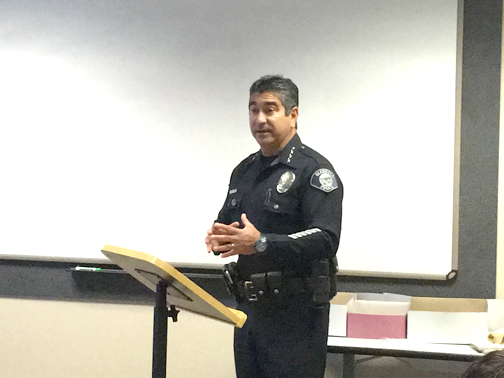By Charly SHELTON
The Montrose Shopping Park Assn. held its monthly meeting last Thursday and the main topic of discussion, as with many meetings in Glendale, was the Utility Users Tax.
For those unfamiliar with the UUT, controversy surrounds its possible repeal. In total, the UUT is a 7% tax levied on electricity, gas and water, and a 6.5% tax on telecommunications and video. This amounts to $17.5 million in locally controlled funds and represents about 9% of the general fund that Glendale operates on annually. Measure N, the bill to repeal the UUT, will go on the ballot in June during the presidential primaries. A vote of yes on Measure N would cut the UUT, and a vote of no would keep the tax where it is. City Manager Scott Ochoa, Glendale Fire Dept. Chief Greg Fish and Glendale Police Chief Robert Castro came to the MSPA meeting to go over some of the finer points of what the UUT is and what the ramifications of its repeal could be.
“What I hear from you is the same thing I hear from Mr. [Bill] Taliaferro, the gentleman who is espousing this, ‘Let’s do something. We have to do something.’ His words. ‘Let’s do something,’” Ochoa said. “Now what the outcome of that ‘something’ is, that’s somebody else’s problem, let somebody else figure it out.”
Ideas were presented on what might be cut should the repeal be voted in. One suggestion that the Glendale City Council had tried to work with was closing down a low performing library, but almost as soon as it was closed, the council was met with public outcry to reopen it and the council was subsequently sued. So rather than taking the money from the parks and libraries, the only department that hadn’t been drastically cut yet, Ochoa said, were police and fire.
During the recession, consecutive years of general fund cuts from 2008 through 2014 hit many of the departments hard. The general fund was cut by $29.5 million, 406 city employee positions were eliminated and many of the benefits that employers usually provided for their employees were dropped or covered by the employees themselves. Despite these cuts, the police and fire departments continued to better the state average in response times – fire and paramedics responding at five minutes 17 seconds versus a state average of six minutes 52 seconds and police responded in four minutes 10 seconds versus a state average of six minutes plus.
“We have a radio code that we put out that means there’s one unit available in the city, citywide,” Castro said. “That code goes out 10 to 15 times a day because of the demand of our call load. We get 10,500 calls a month; that’s what we’re responding to when the police department has been cut 25% since the great recession. So we’re really looking at different ways that we can do things.”
Cuts to police and fire departments could mean slower response times, fewer available services and fewer available units. The UUT repeal could have lasting effects for the city as there are no other sources of income beyond what is currently available, Ochoa said, and therefore it cannot be made up elsewhere.
“So [for example,] we’re talking about closing loopholes on sales tax – put it to a vote, I will vote for it, tell me to sign a petition, I will sign it,” Ochoa said. “But ultimately, as we have through our own lobbying efforts, tried to get the state of California to close those loopholes, they will not do it and neither will the federal government. The proponents of Measure N will say, ‘You know what, I can’t have an impact at the federal level and I don’t have much of an impact at the state level but at the local level – that’s where I’m going to go have my impact.’ The idea of just go do something – well, slapping myself in the face is doing something but it doesn’t make anything much better, it doesn’t help. Cutting off my own nose to spite my face doesn’t make life any better.”
For more information on the UUT and Measure N, visit glendaleca.gov/government/uut-education.


